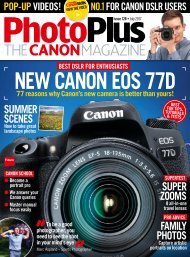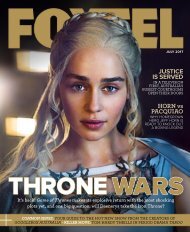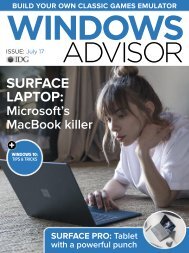Create successful ePaper yourself
Turn your PDF publications into a flip-book with our unique Google optimized e-Paper software.
VIDEOGAMES<br />
HOW TO PLAY IT<br />
WILLIAM BALDWIN<br />
Software, intangible bits in a memory, is worth billions.<br />
But where are the good buys? You could have<br />
more than quadrupled your money buying either<br />
of the big videogame companies five years ago:<br />
Electronic Arts or Activision Blizzard. They are solid<br />
moneymakers now, but their value hangs on entertainment<br />
habits, which could change. You’re better off betting on<br />
software that locks people into business habits (harder to change).<br />
Microsoft and Oracle have their clients addicted to particular databases<br />
and office procedures. They’ll be coining money long after<br />
gamers have gotten bored with Star Wars Battlefront and Destiny 2.<br />
William Baldwin is <strong>Forbes</strong>’ Investment Strategies columnist.<br />
prospered. Today the company has more than 3,000<br />
employees, operates seven successful MMORPGs<br />
and had worldwide sales in 2016 of more than $860<br />
million. “They are a major company in Korea, where<br />
they generate most of their revenue,” says David<br />
Cole, CEO of market research firm DFC Intelligence.<br />
“In the U.S. they are a one-trick pony.”<br />
If NCSoft is going to fix that problem, the responsibility<br />
will fall on NCSoft West’s Genius Girl<br />
chief executive. Korean newspapers gave Yoon the<br />
nickname after she earned a Ph.D. in computational<br />
neuroscience from MIT in 2000, when she was<br />
24, and then quickly climbed the ladder at Mc Kinsey<br />
& Co. and Seoul-based wireless giant SK Telecom.<br />
In 2007, she married Kim and, a year later,<br />
joined him at NCSoft.<br />
“I studied electrical engineering, computer science,<br />
artificial intelligence and brain sci ences, without<br />
knowing that I would be working in the game<br />
industry,” Yoon says. “But everything is so related.”<br />
As NCSoft’s chief strategy officer, she pushed<br />
the company into AI ( to keep customers paying<br />
and playing) and oversaw the development of Guild<br />
Wars’ successful sequel. Yoon was made CEO of<br />
NCSoft West in November 2011.<br />
In May 2015, Yoon launched Iron Tiger Studios,<br />
a new mobile-gaming division, based in San<br />
Mateo, California. NCSoft had only dabbled in mobile<br />
games before. The company’s main products<br />
were games that were huge, complex and expensive<br />
to make, a far cry from the small and inexpensive<br />
games that dominate the mobile market.<br />
It’s a risky strategy. Plenty of game companies in<br />
the U.S. have tried and failed to translate their products<br />
to the mobile market. But mobile is also an “untapped<br />
frontier with fewer built-in biases,” says Michael<br />
Pachter, managing director of equity research<br />
at Wedbush Securities. “I think that some of their<br />
FINAL THOUGHT<br />
“West is where we all plan to go someday.” —ROBERT PENN WARREN<br />
properties will work better in the West on mobile.”<br />
If they do, the rewards could be significant. According<br />
to market research firm Newzoo, mobile is<br />
the largest and fastest-growing segment of the $100<br />
billion global game market, with revenues estimated<br />
to climb 19% in <strong>2017</strong> to $46.1 billion.<br />
NCSoft built out Iron Tiger quickly. It will<br />
reach 150 employees by year’s end, and the studio’s<br />
first game (Aion: Legions of War) is expected<br />
to be released in the next few months. Meanwhile,<br />
NCSoft West is also working on building<br />
better Westernizations of its existing Korean<br />
games—not simply translating the in-game language<br />
but adjusting art to Western styles and<br />
tweaking the action for Western gamers.<br />
“Bringing games directly from Korea to just<br />
translate and publish them taught us what works<br />
and what doesn’t,” Yoon says. “Western players pay<br />
attention to narratives and their experience within<br />
the game . . . but don’t necessarily spend a lot of<br />
time trying to understand the saga and legend behind<br />
it.” Americans also like being heroes, she says,<br />
and are more likely to play solo.<br />
So far, the strategy is working. In January of last<br />
year, NCSoft West released a Westernized version<br />
of its martial arts game Blade & Soul, which debuted<br />
in 2012 in Korea; it was an instant hit, surpassing<br />
a million players in its first month. Today<br />
the game has 4 million paying<br />
players, making it one of the biggest<br />
Korean-developed games NC-<br />
Soft has launched in North America<br />
and Europe. As a result, that<br />
region had 25% sales growth for<br />
2016, the most of any of the company’s<br />
territories. In <strong>2017</strong>, analysts<br />
expect the company’s worldwide<br />
revenues to top 1.3 trillion Korean<br />
won—more than $1.1 billion—for<br />
the first time in its history.<br />
And soon North American<br />
gamers will even get to play games<br />
before NCSoft’s Asian audience<br />
has a crack at them. The company’s newest franchise,<br />
a multiplayer online battle-arena game<br />
called Master X Master, is currently under development<br />
by NCSoft’s lead studio in Seoul but<br />
will make its global debut in North America later<br />
this year.<br />
“It’s U.S. first, developed in Korea, with all our<br />
feedback from the Western regions,” Yoon says.<br />
“And if it’s a great game, then everyone will like it,<br />
whether they’re from this market or another.”<br />
BY THE<br />
NUMBERS<br />
GREAT FLEET<br />
FORWARD<br />
As the Chinese get<br />
richer, they want<br />
bigger cars. Good<br />
news for Detroit? Not<br />
so—Chinese automakers<br />
are the ones cashing in,<br />
offering more affordable<br />
SUVs. In 2016, three<br />
of the five top-selling<br />
vehicles in China were<br />
domestic brands, up<br />
from none just half a<br />
decade earlier.<br />
2016<br />
1. WULING<br />
HONGGUANG<br />
650,018 sold<br />
2. GREAT WALL<br />
HAVAL H6<br />
580,683<br />
3. VOLKSWAGEN<br />
LAVIDA<br />
478,699<br />
4. BUICK EXCELLE GT<br />
370,370<br />
5. BAOJUN 730<br />
370,169<br />
2011<br />
1. BUICK EXCELLE<br />
253,514 sold<br />
2. VOLKSWAGEN<br />
LAVIDA<br />
247,475<br />
3. CHEVY CRUZE<br />
221,196<br />
4. VOLKSWAGEN<br />
JETTA<br />
217,861<br />
5. VOLKSWAGEN<br />
BORA<br />
207,041<br />
Source:<br />
China Association<br />
of Automotive<br />
Manufacturers.<br />
LEFT: THOMAS KUHLENBECK FOR FORBES<br />
JUNE <strong>13</strong>, <strong>2017</strong> FORBES | 45


















